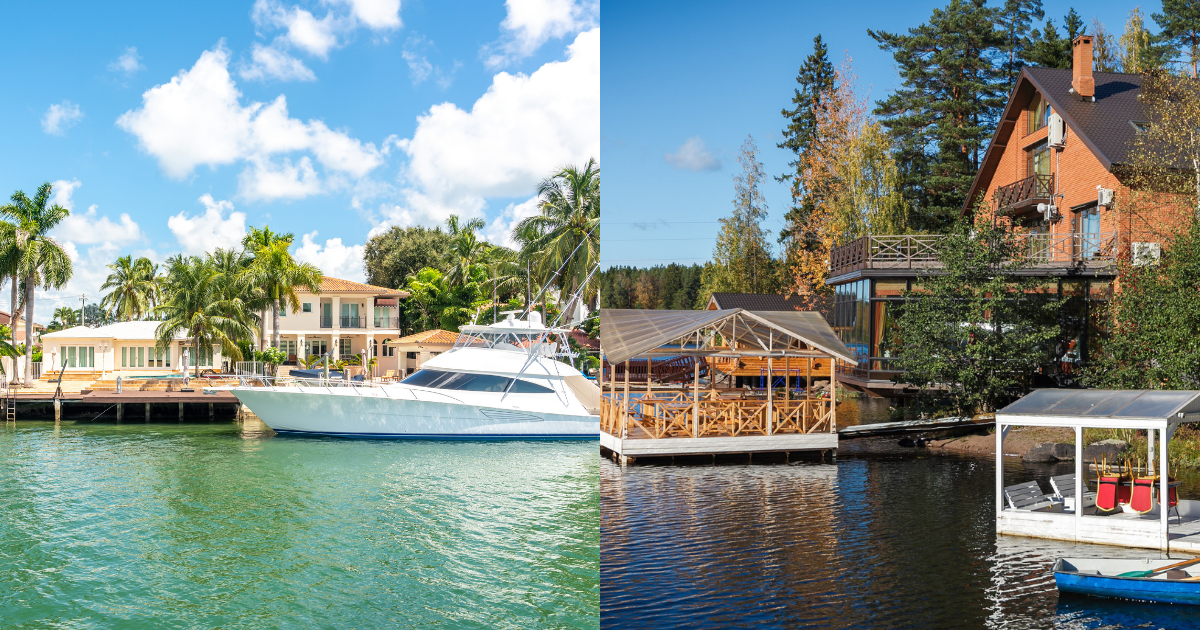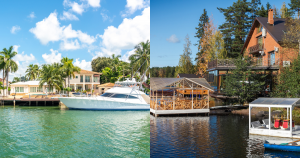
 Is buying a vacation home on your mind? Stuck at home this summer during the pandemic wishing you had somewhere else to go maybe by a lake or the ocean? If so, then it’s essential you understand all the steps that lead to the purchase of this luxury. Whether you’re buying it as a summer/winter getaway or as an investment, a vacation home shouldn’t be a spur of the moment decision.
Is buying a vacation home on your mind? Stuck at home this summer during the pandemic wishing you had somewhere else to go maybe by a lake or the ocean? If so, then it’s essential you understand all the steps that lead to the purchase of this luxury. Whether you’re buying it as a summer/winter getaway or as an investment, a vacation home shouldn’t be a spur of the moment decision.
Having this in mind, you’ll want it to be a carefully thought-out purchase. So, before signing on the dotted line, inform yourself about all the peculiarities you’ll have to deal with. To help you along with the process, we’ve gathered the most important tips on the subject. Buckle up and let’s go!
Determine your budget
Before diving deep into the real estate listings, it’s important to have some guidelines which will help you narrow down your search. The first, and possibly the most important, factor is setting the budget for your future property. After all, you have to agree it makes little sense to waste your time aimlessly touring numerous properties with prices beyond your reach. However, while calculating your mortgage, it’s easy to forget the other costs of owning a vacation home. Keep in mind you’ll need to take the following things into account long after the buying process:
- Taxes associated with buying a vacation home
- Insurance coverage costs
- Property management, including utilities
- HOA and condo fees
- Other costs such as furnishings or equipment like seasonal gear
If you’re struggling with setting a budget, contact a mortgage broker who can help you find the right loan program and rates which will work best for you.
Choose the location wisely before buying a vacation home
So, you’ve set up a realistic budget. Now it’s time to narrow down the search even more by choosing a fitting location. Now, picking the right place depends on various things, but the most important decision is whether you’re viewing it as your own getaway or as an investment property. If you plan on spending prolonged periods of time with your family in your vacation home retreat, then traveling to your second home easily in another state should be your number one priority aside from deciding whether you want to sit by the beach, a lake, or the mountains. Do you prefer the open ocean or the mountains to hike and ski? Do you want to visit this home year-round, or seasonally?
One of the more popular places to purchase a vacation home is in Florida which offers many different areas to buy, from the panhandle to Key West. One option is purchasing a home in a gated community which provides a sense of security, privacy, and a higher property value. Another popular place for people to purchase a vacation home is in New Hampshire! From the mountains to the lake, to the beach, and everything in between, New Hampshire has an abundance of spots to purchase a vacation home!
If you’re buying a vacation home and plan to rent it out, which many people do to help offset the costs of owning it, there are some additional considerations to make when determining its location. First of all, does the area offer more than one season of rental use? Ideally, you’ll want to rent it out for more than 3 months of the year – the more renters, the more income. An attractive location needs to have interesting activities in its vicinity as well, such as eateries, swimming access, etc.
Seek out professional agents to help you
Imagine the following scenario: You’ve found a charming place in New Jersey, and it all looks perfect at first glance. You make a spur-of-the-moment decision and decide to buy it only to find out later that parking in that area is forbidden. To avoid these kinds of problems, booking a reputable real estate agent is a must. Not only are they a great resource in terms of showing you all the nooks and crannies, but they are also experienced in the art of price adjustment. They’ll know exactly how to negotiate on your behalf, which could end up saving you a lot of money. Not to mention that they know what all that paperwork you’ve been struggling to understand actually means. They can help you clarify all the clauses and professional jargon as well as help you uncover any hidden fees you may have skimmed over.
Additionally, agents are experts in the rules and regulations of the area and can be a great resource for you. For example, the state of Florida recently passed new regulations as mortgage lenders tightened their lending guidelines for condos and mandated more frequent condo inspections in response to the tragedy in Surfside.
Beyond the buying process, a reliable agent will stay in contact and help you even after the papers are signed. This can be especially useful if you don’t live near the property.
Know your taxes
Before buying a vacation home, it’s essential you understand that tax rules associated with second homes can be quite complex. It will vary greatly depending on whether it’s classified as a rental property or personal residence. Basically, if you’re using your vacation home for less than 10 percent of the days it’s rented, it’s considered a business. Consequently, if you’re using it for more than 10 percent, then it’s listed as personal property. Inform yourself of the tax breaks which will make owning a vacation home more affordable.
However, keep in mind that laws and tax rules for second homes vary from state to state. To avoid confusion, it’s best to consult with an accountant that can advise you on these issues. The same way professional real estate agents can help you with the buying process, an accountant can help you make sense of the taxes. If you’d like to dig deeper yourself, the IRS’s website has all the information you need.
Understand the Mortgage
The mortgage financing for a second home will be calculated on top of any mortgage debt on your primary home for which you will likely need to make a down payment of 10 percent to 20 percent. In addition to a cash down-payment, there are other options if you don’t have that much saved up. You are able to tap into the equity on your primary home, as well as a HELOC (home equity line of credit), or funds from your 401k to cover the funds for the down payment. Rates tend to be similar to primary mortgages, which is helpful- at least they’re not higher because you’re taking on additional debt! If you plan on using this home as a part-time rental, the good news is this is allowed with a second mortgage, as long as it isn’t a long-term rental. Buying a second home is an exciting prospect, but it is important to talk to an experienced lender before making a large financial investment.
Take your time
The most important thing during the process is to go slowly and avoid making rash decisions. Having an understanding that vacation properties are a lot different than traditional rentals is also important. When renting out the property the income will be dependent on the season. Factoring in the off-season costs, overall monthly expenses, and furnishings is crucial for your rental to be successful. In case you’re buying it for the family vacations, have in mind that you’ll want it close to home as it will be easier to keep it maintained. Yes, buying a vacation home can be a real home run, but only when each step is carefully thought out. For this reason, hiring a professional real estate agent to help you along the way will make a big difference in the final decision.
